Hey there! This post may contain affiliate links, meaning we get a small commission if you make a purchase through our links at no cost to you. I greatly appreciate your support! For more information please check our Disclosure Page.
Coffee is more than just a morning pick-me-up; it is a ritual, a moment of peace, and for many, an essential start to the day. However, if you are health-conscious, you may be looking for something beyond simply a caffeine boost. Organic coffee beans, grown without harmful chemicals and pesticides, offer a cleaner, more eco-friendly option for coffee lovers. They not only protect your health but also support sustainable farming practices that are better for the environment.
This article presents the top organic coffee beans that cater to health-conscious individuals. This collection includes options for every coffee lover, whether you are looking for bold flavors, sustainably sourced beans, or specific health benefits.
What Makes Coffee Beans Organic?
When coffee beans bear the label “organic,” it implies they have been grown and processed following strict guidelines that prioritize environmental sustainability and the exclusion of synthetic chemicals.
To be labeled organic, coffee farms must meet the standards set by certifying organizations like the USDA (United States Department of Agriculture), EU Organic Certification, or other regional organic certifications.
These bodies have stringent guidelines on what constitutes organic farming, and farms are regularly inspected to ensure compliance.
Organic coffee goes beyond just the absence of pesticides; it encompasses a holistic approach to farming that benefits the environment, the farmers, and the final consumer.
How to Choose the Best Organic Coffee Beans
To choose the best organic coffee beans, look for USDA Certified Organic labels to ensure the beans are grown without synthetic pesticides or GMOs. Give preference to companies with certificates for ethical and sustainable sourcing, such as Rainforest Alliance or Fair Trade, and consider shade-grown options for environmental benefits.
Consider light, medium, or dark roasts when choosing a flavor profile, and be mindful of the acidity levels if you have a sensitive stomach. Again, opt for light, medium, or dark roasts when choosing a flavor profile, and be mindful of the acidity levels if you have a sensitive stomach.
Choose freshly roasted beans that have not been roasted too long, and go between single-origin coffees for unique flavors and blends for balance. Think about brands that test for mold and mycotoxins for additional health benefits.
Top 15 Organic Coffee Beans
1. Lifeboost Organic Coffee
Lifeboost Organic Coffee consistently tops the list for health-conscious consumers. Grown at high altitudes in the Nicaraguan mountains, this single-origin coffee has a richer flavor with less acidity.
The beans are perfect for people who are sensitive to acidity or additives because they are cultivated in the shade without the use of chemicals or pesticides.
Why It’s Healthy
- Chemical-Free and Non-GMO: Certified organic, ensuring no exposure to harmful pesticides.
- Low Acid: Ideal for individuals with sensitive stomachs.
- Fair Trade Certified: Supports ethical farming practices.
Flavor Profile: Lifeboost Coffee boasts a smooth, well-rounded flavor with hints of caramel and chocolate.
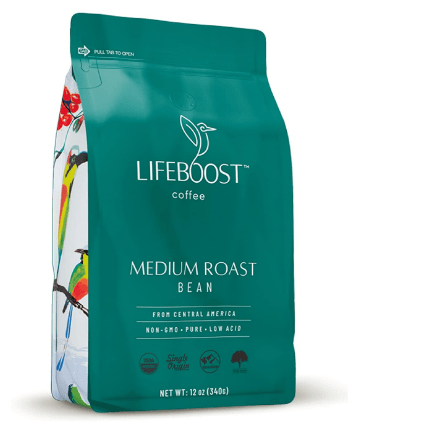
Fig. 1: Lifeboost Organic Coffee (Amazon).
2. Death Wish Organic Coffee
Known as the “world’s strongest coffee,” Death Wish Organic Coffee is perfect for those who need a powerful caffeine kick. Despite having high levels of caffeine, the brand offers USDA-certified organic beans that are devoid of harmful pesticides and chemicals, putting sustainability and health first.
Why It’s Healthy
- Certified Organic: Ensures no harmful chemicals are used in production.
- Fair Trade Certified: Ethically sourced, promoting fair wages for farmers.
- High Caffeine Content: Provides an intense energy boost with clean ingredients.
Flavor Profile: Bold, robust flavor with hints of cherry and chocolate, perfect for those who like their coffee strong. Death Wish Organic Coffee is designed for individuals who prefer a strong, bold cup of coffee without a bitter aftertaste.
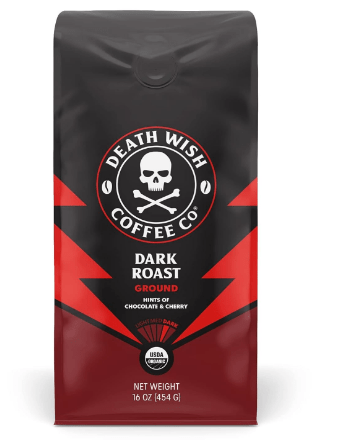
Fig. 2: Death Wish Organic Coffee (Amazon).
3. Kicking Horse Coffee
Kicking Horse Coffee provides a variety of organic coffee blends that are ideal for every coffee drinker. Besides, their beans are 100% certified organic and shade-grown in the Rocky Mountains of Canada. Kicking Horse Coffee is known for its robust and full-bodied flavor, perfect for both espresso and drip coffee.
The brand provides a broad range of coffee blends, from light to dark roasts. Chocolate, fruit, and nut undertones are just a few of the unique flavor characteristics that are highlighted in each blend.
Some of their most popular blends include “Kick-Ass” (a dark roast), “Three Sisters” (a medium roast), and “Grizzly Claw” (a rich, chocolatey dark roast).
Why It’s Healthy
- USDA Certified Organic: Grown without synthetic pesticides and fertilizers.
- Fair Trade Certified: Promotes sustainability and ethical sourcing.
- Shade-Grown: Helps maintain biodiversity and healthier ecosystems.
Flavor Profile: Kicking Horse Coffee is known for its rich, complex flavors with notes of chocolate, caramel, and fruit.
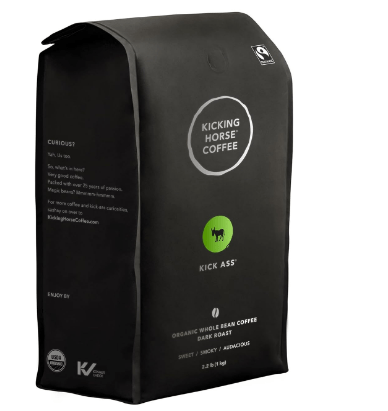
Fig. 3: Kicking Horse Coffee (Amazon).
4. Café Don Pablo Subtle Earth Organic Coffee
Café Don Pablo provides a range of organic coffee blends, but their Subtle Earth Organic Coffee stands out for its quality and flavor. This coffee is grown in Honduras and roasted in small batches to ensure maximum freshness.
The brand is known for its smooth, well-balanced flavor and dedication to organic farming.
Again, Café Don Pablo stresses small-batch roasting, which guarantees freshness and consistent quality in every batch of coffee.
It appeals to people looking for a rich, smooth, and environmentally conscious coffee experience.
Why It’s Healthy
- Non-GMO & Organic: Grown without chemicals, pesticides, or genetically modified organisms. It is USDA-certified organic.
- Low Acidity: Less harsh on sensitive stomachs.
- Hand-Picked Beans: Ensures only the best quality beans are selected.
Flavor Profile: A smooth, medium-dark roast with hints of honey, chocolate, and caramel.
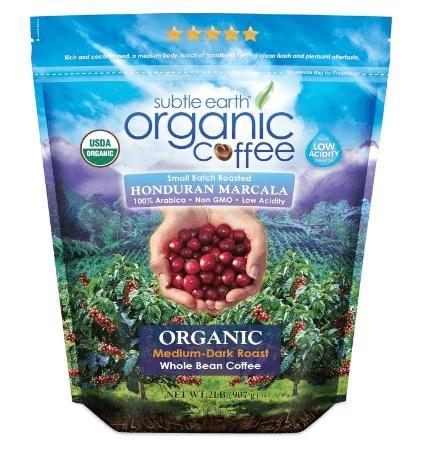
Fig. 4: Café Don Pablo Subtle Earth Organic Coffee (Amazon).
5. Java Planet Organic Coffee Beans
Java Planet is a family-owned brand that prioritizes health, quality, and sustainability. Their organic coffee beans are sourced from Colombia, and they provide a range of roasts, from light to dark, to suit every palate.
The brand stresses ethical sourcing, working directly with coffee farmers to ensure fair trade practices and sustainable farming methods.
Java Planet provides a variety of roasts, from light to dark, and sources its beans from different coffee-growing regions, including Central and South America.
Popular Java Planet varieties include Colombian, Guatemalan, and Sumatra beans, each with unique flavor profiles.
Why It’s Healthy
- 100% Certified Organic & Non-GMO: Free of harmful pesticides and chemicals. It is USDA Certified Organic and free from genetically modified organisms, ensuring that the coffee is grown without harmful synthetic pesticides or chemicals.
- Shade-Grown: Promotes biodiversity and protects wildlife.
- Fair Trade Certified: Ethical sourcing practices that support coffee farmers.
Flavor Profile: Java Planet coffee is known for its smooth, clean taste with hints of chocolate and fruit.
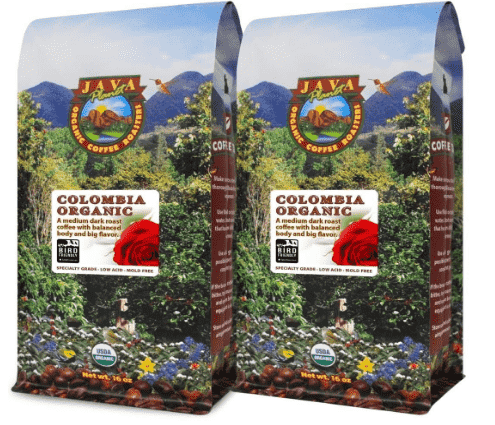
Fig. 5: Java Planet Organic Coffee Beans (Amazon).
6. Equal Exchange Organic Coffee
Equal Exchange is a pioneer in the fair trade coffee movement and has been committed to offering ethically sourced organic coffee for over the past decades. Their beans are sourced from small farmer cooperatives around the globe, ensuring high-quality, sustainable coffee.
Again, the brand is known for its commitment to fair trade, working directly with small-scale coffee farmers organized in cooperatives. This guarantees that farmers are fairly compensated and have influence across the supply chain.
Equal Exchange provides a wide range of coffee roasts, such as light, medium, and dark. Additionally, they provide alternatives with different flavor notes like fruit, chocolate, and spice that are single-origin from regions including Latin America, Africa, and Asia.
Why It’s Healthy
- Certified Organic: Free of synthetic fertilizers and pesticides.
- Fair Trade Certified: Ensures farmers receive a fair wage for their labor.
- Supports Small Farmers: Helps small-scale farmers thrive through sustainable farming practices.
Flavor Profile: Equal Exchange provides a range of blends, from smooth and balanced to dark and bold, catering to various flavor preferences.
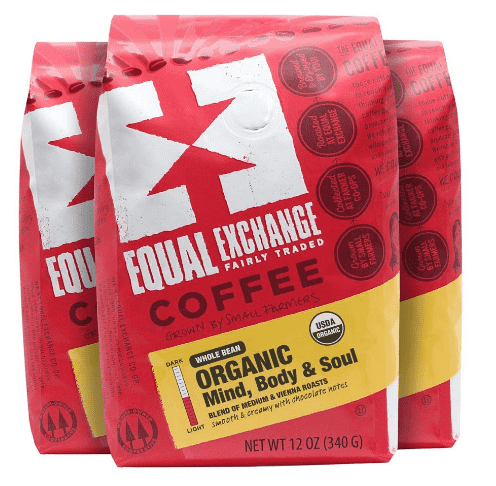
Fig. 6: Equal Exchange Organic Coffee (Amazon).
7. Jo Coffee Organic Beans
Jo Coffee is a top-rated organic coffee brand known for its high-quality, ethically sourced beans. They have an array of organic mixes to suit a range of palates, from fruity and light to dark and potent.
Jo Coffee is USDA Certified Organic and Fair Trade Certified; this makes it an excellent selection for health-conscious individuals who regard ethical sourcing.
Why It’s Healthy
- USDA Certified Organic: Free of harmful pesticides and chemicals.
- Non-GMO: Ensures no genetically modified organisms in the beans.
- Fair Trade Certified: Supports ethical practices in coffee production.
Flavor Profile: Jo Coffee provides a variety of flavors, from bright and citrusy to rich and chocolatey, ensuring there’s something for every coffee lover.
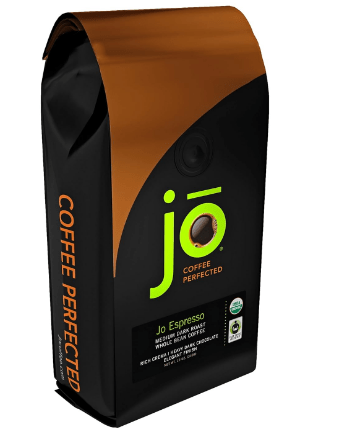
Fig. 7: Jo Coffee Organic Beans (Amazon).
8. Tiny Footprint Coffee
Tiny Footprint Coffee is a distinctive brand that combines organic coffee with environmental sustainability. As the first carbon-negative coffee brand in the world, they offset more carbon than they produce by planting trees in Ecuador’s Mindo Cloud Forest for each bag of coffee sold.
The coffee beans are shade-grown under the canopy of natural forests, promoting biodiversity and organic farming methods without synthetic chemicals.
Besides, Tiny Footprint Coffee provides a variety of roasts and blends, from light to dark, as well as single-origin options.
Some of its most well-known blends include “Dark Roast,” “Cold Press Elixir,” and “Nicaragua Segovia.”
Why It’s Healthy
- Certified Organic: Grown without synthetic chemicals.
- Carbon-Negative: Helps reduce carbon emissions and supports reforestation efforts.
- Fair Trade Certified: Ensures ethical and sustainable farming practices.
Flavor Profile: Tiny Footprint Coffee is known for its bright, fruity flavors with notes of chocolate and nuts, making it a versatile choice for different brewing methods.
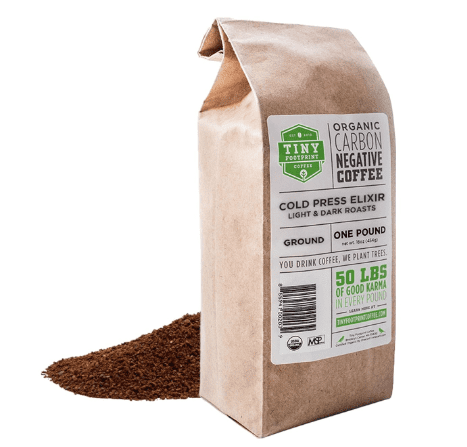
Fig. 8: Tiny Footprint Coffee (Amazon).
9. Kion Coffee
Kion Coffee is a high-quality organic coffee brand that prioritizes performance, health, and purity. They carefully source their beans from organic farms and test them for mold, mycotoxins, and pesticides to ensure that the coffee is as clean as possible.
Kion Coffee is ideal for people who prioritize health and wellness. The brand is renowned for its commitment to creating coffee devoid of toxins including mycotoxin, mold, and pesticides.
The beans undergo rigorous testing to ensure purity and quality.
Why It’s Healthy
- Tested for Mold & Mycotoxins: Ensures a clean, pure coffee experience.
- Certified Organic: No harmful pesticides or chemicals.
- Fair Trade Certified: Supports sustainable and ethical farming.
Flavor Profile: Kion Coffee has a smooth, balanced flavor with hints of fruit and chocolate, making it a great option for those who prefer a clean-tasting coffee.
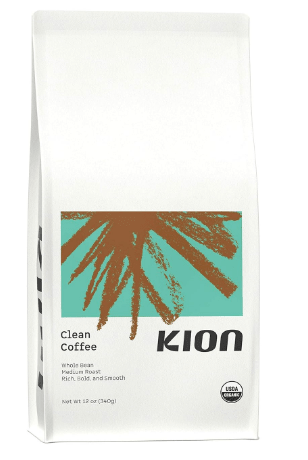
Fig. 9: Kion Coffee (Amazon).
10. Stone Street Coffee
Stone Street Coffee is a Brooklyn-based coffee roaster that provides a range of organic coffee options.
Their beans are sourced from organic farms around the world and roasted in small batches to ensure maximum freshness.
Besides, Stone Street Coffee is known for its high-quality beans and rich flavors.
Why It’s Healthy
- USDA Certified Organic: Grown without harmful chemicals or pesticides.
- Small-Batch Roasted: Guarantees freshness and quality.
- Ethically Sourced: Supports sustainable farming practices.
Flavor Profile: Stone Street Coffee provides a broad range of flavors, from smooth and mellow to bold and robust, ensuring there’s something for every coffee lover.
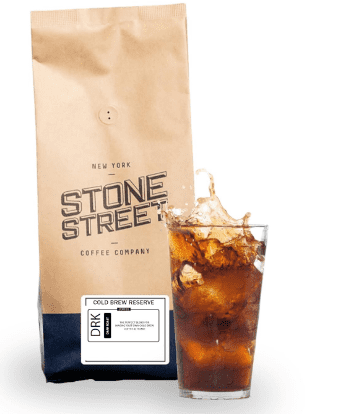
Fig. 10: Stone Street Coffee (Amazon).
11. Allegro Organic Coffee
Allegro Organic Coffee is a brand known for its commitment to quality, sustainability, and ethical sourcing. It is a great option for coffee lovers who seek responsibly sourced, high-quality coffee with a focus on ethical practices and sustainability.
The brand provides a range of roasts and blends, from light to dark, as well as single-origin coffees from regions like Africa, Latin America, and Asia.
Every choice highlights the distinct tastes of its place of origin, ranging from deep, chocolatey undertones to fruity and floral overtones.
Why It’s Healthy
- 100% Organic: Allegro Organic Coffee is USDA-Certified Organic
- Fair Trade Certified: Supports sustainable and ethical farming.
- Sustainably Sourced: Allegro emphasizes sustainable sourcing, partnering with farms that prioritize environmentally friendly practices, such as shade-grown coffee cultivation that supports biodiversity.
Flavor Profile: Allegro Coffee is roasted in small batches to ensure consistency and quality in every cup. This approach allows the natural flavors of the beans to shine.
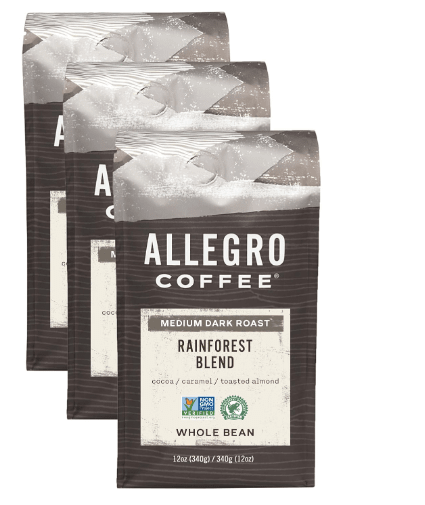
Fig. 11: Allegro Organic Coffee (Amazon).
12. Volcanica Coffee
Volcanica Coffee is a specialty coffee brand known for its premium, high-altitude coffee sourced from volcanic regions around the world. It is a perfect choice for coffee connoisseurs looking for high-quality, exotic coffees with unique flavor experiences and a focus on sustainability.
Volcanica Coffee comes from coffee plantations in volcanic areas, where the high altitudes and mineral-rich soil give the beans their unique and colorful flavor profiles.
Why It’s Healthy
- 100% Organic: Many of their coffees are USDA Certified Organic.
- Fair Trade Certified: Supports sustainable and ethical farming.
- Specialty Grade Quality: The brand places a strong emphasis on providing only carefully chosen, specialty-grade coffee beans that adhere to exacting criteria for freshness, flavor, and quality.
Flavor Profile: Volcanica Coffee is renowned for its complex and rich flavor profiles, which frequently include crisp acidity, fruity notes, and deep, chocolaty undertones. This is because of the volcanic soil and high-altitude growth conditions.
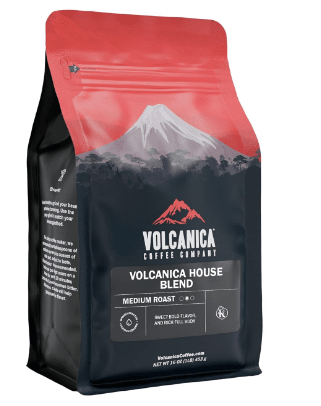
Fig. 12: Volcanica Coffee (Amazon).
13. Stumptown Coffee Roasters
Stumptown Coffee Roasters is a specialty coffee brand renowned for its high-quality, carefully sourced beans and commitment to craft roasting.
Again, the brand is renowned for establishing a direct trade model and forging close bonds with coffee growers to guarantee the highest-quality, ethically sourced beans.
Why It’s Healthy
- Exceptional Quality: Stumptown focuses on selecting only the best specialty-grade beans from various coffee-growing regions, including Latin America, Africa, and Southeast Asia.
- Freshness: Their rigorous selection procedure yields consistently excellent coffee that emphasizes freshness.
- Small-Batch Roasting: Their roasting method is intended to enhance the inherent tastes without masking them, producing subtle, well-balanced coffees.
Flavor Profile: Stumptown provides a broad range of coffees, from signature blends like “Hair Bender” to single-origin alternatives that showcase the unique flavors of specific regions.
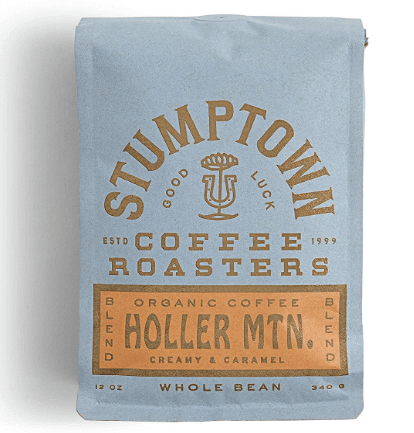
Fig. 13: Stumptown Coffee Roasters (Amazon).
Health Benefits of Organic Coffee
Organic coffee has many health benefits because of its clean production process, absence of synthetic chemicals, and higher nutritional quality. Some of the main health benefits of organic coffee are discussed below.
Free of Toxic Chemicals: Organic coffee is grown without synthetic pesticides, herbicides, or fertilizers, reducing your exposure to harmful chemicals that can negatively impact health. This is especially significant as conventional coffee is one of the most chemically treated crops worldwide.
Higher Antioxidant Levels: Antioxidants like polyphenols, which aid in the body’s defense against oxidative stress, are more prevalent in organic coffee beans. These antioxidants have been linked to heart health support, inflammation reduction, and a decreased risk of chronic illnesses.
Promotes Gut Health: Organic coffee is usually easier on the stomach, particularly if you choose low-acid varieties. Organic coffee is a healthier option for people with sensitive stomachs because it doesn’t include any artificial chemicals and is processed using natural processes, which lessen the chance of discomfort or digestive problems.
Lower Risk of Mycotoxins: Certain organic coffee brands go beyond the norm in their testing to check for potentially dangerous substances known as mold and mycotoxins. opting for organic coffee that has undergone testing for these pollutants can lower the chance of coming into contact with these harmful substances.
Rich in Essential Nutrients: Organic coffee beans keep more of their inherent minerals, such as magnesium, potassium, and B vitamins. These nutrients assist the body in a number of ways, including energy metabolism, muscle function, and general health.
Enhances Mental and Physical Performance: Organic coffee, like conventional coffee, includes caffeine, which can enhance mental and physical performance as well as alertness and focus. The absence of synthetic chemicals ensures that you’re getting a purer form of this natural stimulant.
Organic Coffee and Brewing Methods
Brewing organic coffee is not just about selecting high-quality beans; it’s also about choosing the right brewing method to extract the best flavors while preserving the health benefits.
Various brewing techniques can highlight distinctive qualities in organic coffee, enhancing the flavor and enjoyment of your brew. Following is a guide to the ideal brewing methods for organic coffee.
French Press
Best for: Medium to dark roast organic coffee with bold, rich flavors.
The French Press uses a full-immersion brewing method, allowing the coffee grounds to steep in water, which extracts more oils and flavors. The oils released during brewing have a clean, natural flavor because organic coffee doesn’t include any artificial chemicals.
Additionally, the metal filter also allows the oils to pass through, giving a richer, more full-bodied cup.
Pour-Over (e.g., Chemex, Hario V60)
Best for: Light to medium roast organic coffee with complex flavor notes.
Pour-over brewing is ideal for highlighting the nuanced flavors of organic, single-origin beans. Besides, the method allows for manual control over the water flow and brewing time by pouring hot water over coffee grinds in a filter.
This accuracy contributes to highlighting the clear, vibrant tastes that are frequently present in organic coffee.
Espresso
Best for: Dark roast organic coffee or espresso-specific blends.
Espresso brewing employs high pressure to extract a concentrated shot of coffee in a short amount of time. Organic coffee’s pure and clean beans are perfect for espresso, as they can deliver a robust, rich flavor without the bitterness or harshness that can be linked with lower-quality beans.
Cold Brew
Best for: Medium to dark roast organic coffee with smooth, low-acid flavors.
Cold brewing entails steeping coffee grounds in cold water for an extended period (usually 12-24 hours). This approach is ideal for health-conscious customers who prefer low-acid coffee since it produces a smooth, naturally sweet brew with lower acidity.
Organic coffee’s natural flavors shine in this method, as the slow extraction preserves the beans’ natural sweetness and minimizes bitterness.
Aeropress
Best for: Light to medium roast organic coffee with bright, crisp flavors.
The Aeropress uses a combination of pressure and immersion brewing, allowing for a quick and clean cup of coffee. It is versatile and can make a range of coffee drinks, from lighter drip coffee to espresso-like concoctions.
Organic beans do well in Aeropress because of their natural quality; This is emphasized in the clean extraction process.
Drip Coffee Maker
Best for: Medium roast organic coffee with balanced flavors.
The drip coffee maker is a classic brewing method that works well with organic coffee beans, especially those with a balanced flavor profile.
The automatic brewing process extracts a consistent flavor, and using high-quality organic beans ensures that you’re getting a clean and chemical-free cup.
Choosing the right brewing method can enhance your organic coffee experience by highlighting the natural flavors and health benefits of the beans.
Whether you like your coffee strong and espresso-flavored, smooth and cold brewed, or crisp and pour-over, organic coffee makes a better, more nourishing cup.
By pairing organic coffee with the ideal brewing method, you can enjoy both the taste and health benefits of your favorite brew.
Organic Coffee Trends
The organic coffee market has been growing steadily as consumers become more health-conscious, environmentally aware, and ethically driven. Below are some of the key trends shaping the world of organic coffee today.
Sustainability and Eco-Friendly Packaging
With growing environmental concerns, many organic coffee brands are embracing sustainable practices beyond just organic farming.
This includes supporting carbon-neutral production methods and the use of environmentally friendly packaging composed of recyclable or biodegradable materials.
This Is Important because consumers are searching for strategies to lessen their influence on the environment, and they are choosing brands that share their values by emphasizing sustainability.
Direct Trade and Ethical Sourcing
People are increasingly interested in how their coffee is sourced, resulting in a rise in direct trade practices.
This involves developing direct relationships with coffee farmers, ensuring they get fair compensation and working conditions.
Direct trade allows for more transparency in the supply chain, and several organic coffee brands are adopting this model to support farmers and promote ethical sourcing.
Health-Focused Coffee
As more people prioritize health, organic coffee brands are emphasizing the health benefits of their products.
This entails providing low-acid alternatives for people with sensitive stomachs and pushing coffee that is free of mold, mycotoxins, and pesticides.
This is significant because there is an increasing correlation between coffee and wellness, and consumers who are concerned about their health are looking for organic solutions that promote their general well-being.
Cold Brew and Ready-to-Drink Organic Coffee
The demand for ready-to-drink (RTD) organic coffee products and cold brew coffee is surging.
These convenient options cater to the on-the-go lifestyle of modern consumers while maintaining the health benefits of organic coffee.
This is significant because there is a growing need for ready-to-drink, healthful beverages. Innovative cold brew and RTD choices from organic coffee brands are helping to address this demand.
Specialty Organic Coffee
There is an increasing focus on high-quality, specialty organic coffee, which highlights unique flavor profiles and single-origin beans.
People are growing more discerning and are prepared to spend more for superior quality and moral production methods.
This trend elevates the overall coffee experience by providing organic coffee with rich, diverse flavors while supporting sustainable and ethical farming practices.
Coffee Storage Tips
Proper storage is essential to maintaining the freshness, flavor, and aroma of your coffee beans. Whether you use regular or organic coffee, here are some storage strategies to keep it fresh-tasting cup after cup.
Keep Coffee Beans Whole
Grind your coffee beans just before brewing to preserve the flavor and aroma. Whole beans retain their freshness longer than pre-ground coffee, which loses its flavor more quickly due to increased exposure to air.
This is significant because grinding coffee exposes more surface area to oxygen, hastening the deterioration of the oils and tastes. This process can be slowed down by storing whole beans.
Use an Airtight Container
Store your coffee in an airtight container to prevent exposure to air, which can cause the beans to oxidize and lose their freshness. Choose receptacles that have an airtight or vacuum-sealed lid.
One of the primary causes of stale coffee is oxygen. Longer shelf life and less oxidation are achieved by storing coffee in an airtight container.
Store in a Cool, Dark Place
Coffee should be stored in a cool, dark area away from heat, humidity, and direct sunlight. A cabinet or pantry is a perfect place.
This is important because coffee beans can be adversely affected by heat, light, and moisture, which can lead to a loss of flavor and aroma.
Keeping them in a cool, dark environment helps preserve their integrity.
Avoid the Fridge and Freezer
Do not store your coffee in the refrigerator or freezer unless you’re planning on long-term storage. Regular temperature fluctuations can lead to condensation and a build-up of moisture, which can degrade the beans’ quality.
This is important because coffee beans are porous, they can take in moisture and smells from the freezer or refrigerator, which can alter the flavor.
The ideal storage conditions for short-term items are room temperature and dryness.
Use Opaque Containers
Store your coffee in opaque containers rather than clear ones to prevent exposure to light, which can degrade the quality of the beans over time.
This matters because light exposure can cause coffee to lose its flavor and freshness. An opaque container helps shield the beans from light, preserving their quality.
If you must store coffee for an extended period, freeze it in small, airtight, vacuum-sealed bags or containers. Ensure you divide the coffee into portions to avoid repeated exposure to air.
Conclusion
Choosing organic coffee beans is a simple way to prioritize your health and contribute to a more sustainable coffee industry.
The top thirteen organic coffee brands listed here provide a range of options for health-conscious individuals, from low-acid blends to carbon-negative beans.
By choosing high-quality, ethically sourced coffee, you can enjoy your daily cup with the peace of mind that you’re making a positive impact on your health and the planet.
Whatever brand you decide on, these organic coffee options will improve your cup of coffee by offering you full-bodied flavors, pure ingredients, and a more healthful way to sip your favorite beverage.


